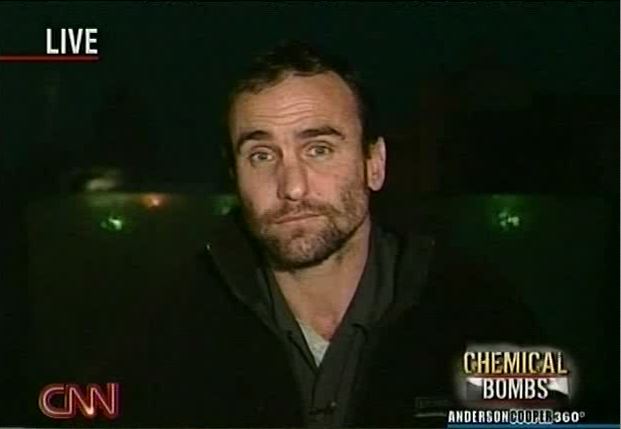AC: "These people don't have to die to spread the fear."

Click photo to play
Length: 3:18
ANDERSON COOPER: To Iraq now -- tonight, more to report on those dirty bombs filled with chlorine that we told you about yesterday.
A U.S. military commander said today that a raid this week near Fallujah uncovered car bombs and a range of weapons, including chlorine cylinders.
Joining me now from Baghdad, CNN's Michael Ware.
Michael, good to see you.
You say that insurgents have actually been experimenting with these chemicals since 2003, 2004. Why a surge in these attacks now?
MICHAEL WARE, CNN CORRESPONDENT: Yeah, I don't know. That's a good question, Anderson.
I mean, we know that the insurgents have dabbled with different forms of chemical munitions. I mean, I have seen some of their arsenals, where they have been emptying mortars and refilling them with certain substances.
Now, on one occasion, one of these substances actually burned my throat when I breathed it in. On another occasion, they sent me a substance as an example of what they were doing, and I had to have a hazmat team come to my house in Baghdad and take that away.
One theory -- and this is a theory that might also apply to the current strategy of attacking U.S. helicopters -- that al Qaeda is, by and large, behind these things. We have seen, with the sectarian divide that's increased here in Iraq, more and more Baathists and former members of the army driven towards al Qaeda, secularists who don't share the Islamic agenda, but feel they have got no other choice.
Now, they may have taken certain skills with them to al Qaeda. And, remember, there was a massive military industrialization commission here in Iraq. Also bear in mind that these are very simple bombs. Much of the chlorine is being burned up in the actual explosion itself. Chlorine is very hard to use as a weapon. Its real impact is terror.
COOPER: Yeah, I mean, it gets to my next question, which is, is the the explosions which kill more people or the actual chemicals which kill?
I mean, we have talked in the past -- and the U.S. military has made a point to point out how this is a learning enemy. The insurgency learns from our tactics. They change their tactics accordingly. How good are they right now at chlorine attacks?
WARE: Well, this is still very, very embryonic.
I mean, we now know of at least three such attacks of varying natures. There's two types, basically. One is your car strapped full of explosives, that you're heading off to attack a target, you throw some chlorine cylinders in there with it. That's one type.
The other type that we have seen is actually a chlorine gas tanker truck that is rigged to explode. But, either way, there's problems with distributing that chlorine as a cloud, as a weapon.
So, what we know is, for example, in Ramadi, in one of the three cases we know of, 16 people were killed. But it's unclear just how many were killed by the explosion, how many were killed by the gas.
We do know that, in the two attacks this week -- one in Baghdad, one just north of Baghdad -- 11 people killed. The real number, though, is more than 200 hospitalized with respiratory illness. Those people don't have to die to spread the fear amongst the community.
COOPER: There is certainly that.
Michael Ware, stay safe. Michael, thanks.
